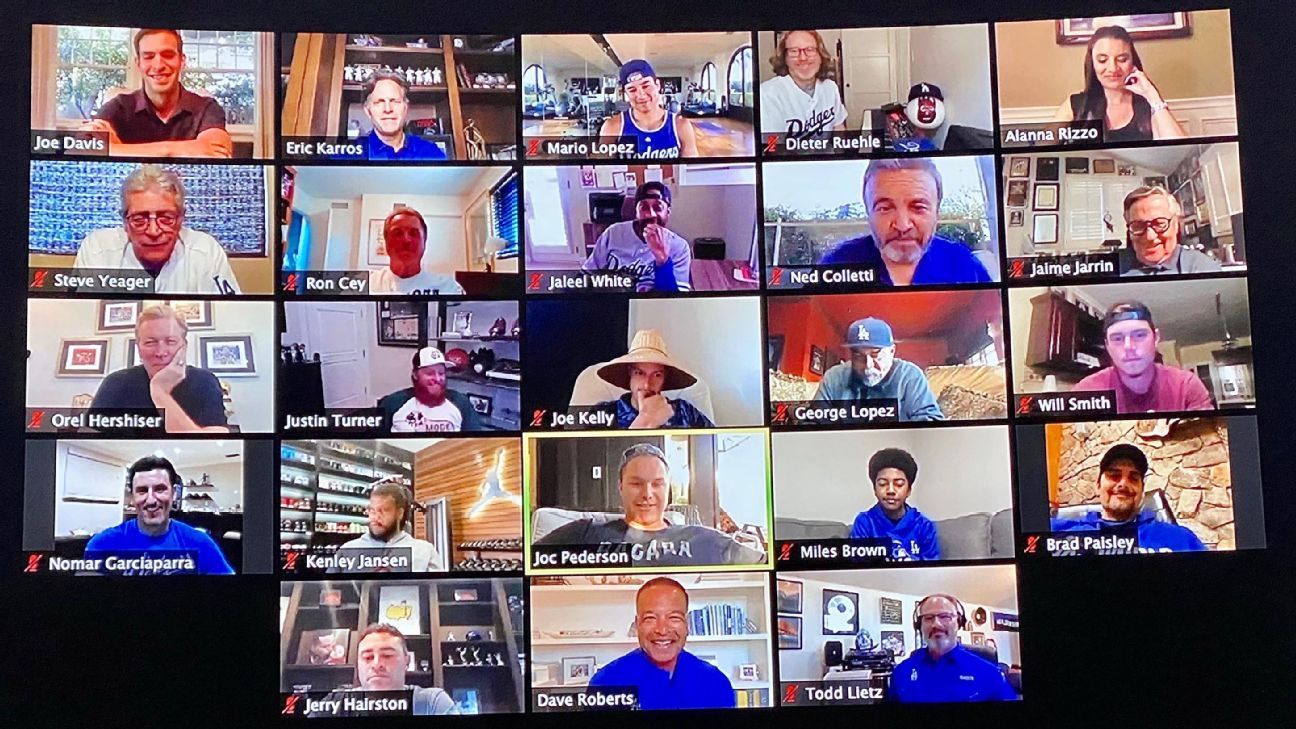IT BEGAN WITH the hype video that was supposed to introduce the 2020 Los Angeles Dodgers on Opening Day. Organist Dieter Ruehle followed by playing the national anthem and “Take Me Out to the Ballgame” from his home piano. Third baseman Justin Turner, closer Kenley Jansen and manager Dave Roberts shared updates on their suddenly monotonous lives. Comedian George Lopez cracked jokes at the Houston Astros‘ expense and country musician Brad Paisley wore a Dodgers sweatshirt that described the team as “2017 World Series Champs.”
Along the way, the Dodgers’ first live Zoom event provided its fair share of predictable glitches — ringing cellphones, awkward silences and buffering videos, one of which distorted an uplifting message from Vin Scully. Joe Davis, the Dodgers’ play-by-play voice pressed into virtual hosting duty, cringed through some of the technical difficulties. He thought social media would be as unforgiving as usual. He was wrong.
“The people appreciated whatever we were able to do, even if the video was skipping a little bit, or there were audio issues, or somebody dropped out at some point,” Davis said. “The general sense was that it was like, ‘So what?’ There was an appreciation, it seems like, from the fans that there was something baseball-related to be able to cling onto and distract them for a night.”
The Dodgers initially planned to host 1,000 fans at their first “Zoom Party” on April 27. They ultimately opened it up to 11,000 people. Over the next couple of weeks, the guest list increased to 12,000 and then 15,000, proving two key points about this unimaginable period: Teams are trying anything and everything to fill a massive void amid the coronavirus pandemic, and their fans are here for it — a dynamic that could change the fan-engagement experience forever.
There have been re-airings of old postseason games, broadcaster calls of home movies, training tips from coaches, bedtime stories from players and bracket-style tournaments for items such as jerseys and bobbleheads, all in an effort to create content in a time when baseball’s main content pipeline — live games — has shut off.
Ryan Zimmerman interviewed Dr. Anthony Fauci, a diehard fan of the Washington Nationals. Miami Marlins catcher Francisco Cervelli taught viewers how to make focaccia. Kansas City Royals director of behavioral science Ryan Maid hosted “Mindfulness Mondays” to provide tips on living in the moment. The Cleveland Indians offered instructions for creating games out of items in one’s sock drawer. And former Astros infielder Geoff Blum hosted a series called “Feel Good Stories For The Heart” in hopes of providing some much-needed positivity.
Major League Baseball and the MLB Players Association also teamed up to create an MLB The Show Players League, where big leaguers went head-to-head in video game matchups that were livestreamed on Twitch and broadcast on television during the virtual playoffs, culminating in a final showdown between Tampa Bay Rays ace Blake Snell and Chicago White Sox ace Lucas Giolito that aired on ESPN.
From making pancakes to playing baseball with Charley, follow @ClaytonKersh22 and his family in this episode of A Day in the Life with the Kershaws. pic.twitter.com/tQEJhkyAUp
— Los Angeles Dodgers (@Dodgers) March 30, 2020
“We want to give everybody sort of a relief from what’s going on, and if we can help them and we can entertain them, we’ve succeeded,” Dodgers chief marketing officer Lon Rosen said of his own team’s strategy. “We’re in a really difficult time right now. We all feel like we’re gonna come out the other end and life will come back to some normalcy, but until then, we wanna make sure that we’re connected to our fans and our fans are connected to us. And that’s our mission.”
In pursuit of that, the Dodgers arranged for their director of player performance, Brandon McDaniel, to guide fans through in-home workouts twice a week. They handed a smartphone to Ellen Kershaw so that she could record her husband, Clayton, flipping pancakes and playing Pop-A-Shot. And they utilized Ross Stripling, their agreeable right-handed pitcher, for an interview series with some of his teammates. Davis himself has hosted his own cooking show and also started a podcast with his broadcast partner, Orel Hershiser. The response floored him.
“We’ve had multiple people tell us that it brought them to tears to hear us, multiple people tell us that it’s the best part of their week when that comes out, and their favorite thing during the quarantine,” Davis said of the podcast, called “Off Air.” “Man, we’re just trying to have a fun conversation. We started it realizing the void that everybody was feeling with no baseball, but I don’t think we fully appreciated how big that void was.”
MARCO GONZALES LEFT Arizona shortly after MLB effectively closed spring training complexes on March 15. He hopped in the car with his wife and their dog and drove 1,400 miles to his home near T-Mobile Park, returning to Seattle — the country’s first coronavirus epicenter — for the first time in more than a month.
Gonzales, the left-hander announced as the Seattle Mariners‘ Opening Day starter less than a week earlier, was struck by how a bustling city could feel so desolate. Parks were empty, traffic was nonexistent, stores had shuttered, and the few people he saw, usually at the local supermarket, dressed as if they were “going into surgery.” The anxiety was palpable, omnipresent, and it helped spur Gonzales into action. He donated blood, partnered with a local hunger-relief agency and stepped outside of his comfort zone to help entertain a populace desperate for levity.
The latter morphed into a weekly interview podcast called “Inside Corner,” which Gonzales co-hosts alongside Mariners broadcaster Aaron Goldsmith through the team’s YouTube channel. Catcher Tom Murphy and fellow starters Taijuan Walker and Justin Dunn have made up the first three guests. Murphy spoke from his dining room, which features a 400-pound black bear he snagged on a hunting trip. Dunn, now 6-foot-2, revealed he was shorter than his 4-foot-11 grandmother when he entered high school. Walker estimated owning 400 pairs of sneakers.
“I miss baseball, I miss that interaction with my teammates,” Gonzales said. “And I think the goal of this, ultimately, is for fans to get to know us a little bit better away from the field, and to feel like they’re a little more connected to us.”
It’s part of an ironic twist in all this — a time that is keeping fans from baseball is also allowing them, in some respects, to feel more connected to those who play it. During the season, their time is precious. During the offseason, their time is sacred. But now athletes are stuck at home waiting this out, with unkempt hair and a dwindling supply of toilet paper, just like the rest of us, their money and their fame irrelevant. To pass the time, many have offered rare glimpses into their personal lives and have seemingly become more willing to reveal their true personalities. Gonzales has acted as a willing tour guide.
“The guys that I’ve dealt with, they want people to get to know them as people,” Gonzales said. “Because a lot of times when we’re on the field, we’re in a mindset, we’re in a mentality, that is rare to us as a person. We’re in a competitive, testosterone-driven mindset, whereas right now, when we’re stuck at home, and we have a chance to talk to each other, it’s a lot different communication. And I think that people will hopefully see that.”
Our video editor has been itching to make a hype video. 💥🤯⚾🔥🙌‼️💯
Behold… pic.twitter.com/py3iqS82AT
— Seattle Mariners (@Mariners) April 28, 2020
Kevin Martinez has been overseeing the Mariners’ marketing efforts for the past quarter-century. Four days after MLB suspended its season, Martinez led a meeting that served as a brainstorming session for how the team could pivot in its content strategy and fill an unprecedented void in a reeling city. Martinez saw it as “an opportunity to innovate and think differently.”
It led to a hype video of home movies, a series of tutorials from Mariners coaches, an MLB The Show tournament pitting fans against players, and Gonzales’ podcast.
“Seattle has been one of the most affected by this, and one of the first for sure,” Gonzales said. “We’re trying to get behind the notion that we’ll be one of the first to overcome it and really show the rest of the country what it looks like. Right now, all we can do is try to fill everybody up with some optimism, put some good content out there, and try to just give people that hope that we’re gonna get back to normal as soon as we can.”
#NewSociallyDistantProfilePic pic.twitter.com/44gf6IRMia
— Red Sox (@RedSox) March 24, 2020
BY NATURE OF their status in local communities, sports teams can often serve as information hubs for regions. The Boston Red Sox, for example, represent the baseball team for all six states in the New England region, making Twitter — where the team has more than 6.1 million followers — an ideal platform to distribute factually verified information regarding the pandemic. Kelsey Doherty, senior manager of digital media for the Red Sox, says the team has kept in touch with the Massachusetts Department of Public Health and the State House to stay up to date on the best official safety measures.
“It’s a little nerve-wracking every time I put out any of that messaging, because especially early on, things were changing so rapidly about what was or wasn’t good for you or how you’re supposed to go about things,” Doherty said. “We were linking a lot to the Mass Department of Public Health, but we’re also trying to put the Red Sox spin on it. This weekend we put out, ‘How far is 6 feet really?’ And it’s like, ‘It’s one Rafael Devers away.'”
The Red Sox are far from the only team to use its social media accounts to pitch in. Zimmerman’s interview with Fauci, via the Nats’ Facebook page, delved into plans for slowly and safely restarting the economy. The Colorado Rockies are one club that sponsored a mask-making project, reaching out online to distribute free team-branded masks to front-line workers. New York Yankees first baseman Luke Voit connected with medical staff at NewYork-Presbyterian Hospital. The Baltimore Orioles have been holding Phone Call Fridays, when members of the team check in on fans and first responders.
There have been other notable effects. With no games on the calendar for the near future, each team’s social media account now represents the primary connection clubs have with fans on a daily basis. Typically at this point in the regular season, an internationally iconic team like the Yankees is focused on building hype around the club, selling individual game tickets and targeting tourists who might be coming into New York. Stephi Blank, senior manager of digital and social strategy for the Yankees, says the pandemic has flipped the team’s social focus upside down.
“Especially when thinking about targeting individual game ticket buyers, tourism in New York City is something that is a massive industry, and talking with our colleagues at Broadway and others, you see that so much of the individual game, the individual ticket buyers, come from people who are outside of New York who don’t live there,” Blank said. “That had been a big focus of ours prior to this, but New York has been the epicenter, and we’ve been focusing a lot more on our local fans.”
With no team to root for or games to play, teams are reframing their social media presence to think about fandom as a lifestyle.
“It’s new territory,” Doherty said. “I always joke that I am so grateful that I work in sports because our content can change day to day based on a win or a loss or who had a big night, and now suddenly I’m in this unchartered territory and everyone in sports is, where it’s like suddenly we aren’t dependent on that and we’re dependent on our history, the lifestyle, the fan base and the culture around the team.”
Luke Voit recently surprised frontline medical heroes from our partner @nyphospital to show his appreciation for their strength and hard work.💪💙 @LLVIII40 pic.twitter.com/NRfZPEW81K
— New York Yankees (@Yankees) May 20, 2020
THE LACK OF day-to-day, game-centric content leaves more room to experiment. The Yankees have dabbled in more player personality-driven content, posting intentionally lo-fi workout videos from the likes of Giancarlo Stanton and Luis Severino, shot in vertical video on an iPhone. Yankees head of communications Jason Zillo says the lack of wins and losses allowed baseball’s most traditional brand to let loose and have some fun.
“[Player-personality content] is not only a neat concept, but I think this has legs to live long beyond the pandemic,” Zillo said. “The thing that constantly is a push and a pull during a baseball season is that games matter so much. And you have to temper ‘fun’ things up against the fact that every day, there’s a game that you’re trying to win at all costs. There has to be a measure of caution. If you’ve lost six of eight games, my first mindset isn’t, ‘Let’s do something fun.’ It’s like, ‘Let’s kind of scale back and then when we’ve won six of eight, then maybe we can push more of the fun stuff.'”
Baseball is unique among sports in its challenge of creating inclusive, compelling social media content. The schedule is arduous — nearly every single day, often for about 10 hours, from the middle of February until at least the end of September — and the culture can often feel repressive. Marketers have mostly found players to be less motivated to promote themselves, both because of the volume of their workload and the guaranteed nature of their contracts. Teams, in some respects, have taken a relatively conservative approach on their digital platforms.
But maybe that’ll be different now.
“It has been a challenging time,” Martinez, the Mariners’ senior VP of marketing, said, “but it’s been a time for innovation, and a great opportunity to create fans with our players in ways we haven’t explored before.”
While baseball has been slow to adapt to the new age of social media, the pandemic plopped a mirror in front of many teams. Many took that as an opportunity to try something new — and have seen it bear fruit.
“You hear a lot of people from a lot of different walks of life saying, ‘Use this time to get better at something,'” Zillo said. “I think baseball, as a whole, has, when it comes to looking under different rocks, now, is really using social media and all of its tentacles to reach as many fans as possible.”


